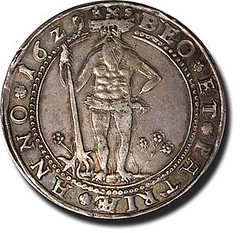
PREV ARTICLE
NEXT ARTICLE
FULL ISSUE
PREV FULL ISSUE
QUERY: WHY IS THE DOLLAR CALLED A DOLLAR?Web site visitor Jill Williams of Appleton, WI writes: My oldest child (8 years old) would like to know why the Dollar is called a "Dollar." This is one I couldn't answer. Can you help us out? I answered: "Great question. There's a long and short answer. The short one is that the word "dollar" was based on older silver coins about the same size, called daalder, daler, or taler in various languages. Here's a longer explanation from Wikipedia:
I also recommended:
en.wikipedia.org/wiki/Thaler
Pictured is a "Wildman" thaler. Can anyone point to a nicely illustrated page showing the progression from early thalers to the U.S. dollar?
-Editor
Wayne Homren, Editor The Numismatic Bibliomania Society is a non-profit organization promoting numismatic literature. See our web site at coinbooks.org. To submit items for publication in The E-Sylum, write to the Editor at this address: whomren@gmail.com To subscribe go to: https://my.binhost.com/lists/listinfo/esylum All Rights Reserved. NBS Home Page Contact the NBS webmaster 
|
